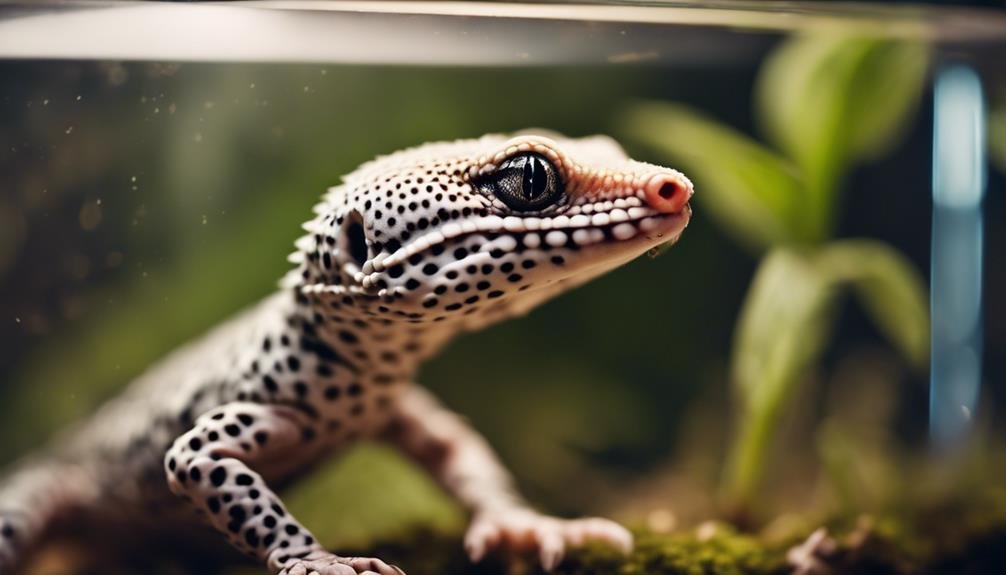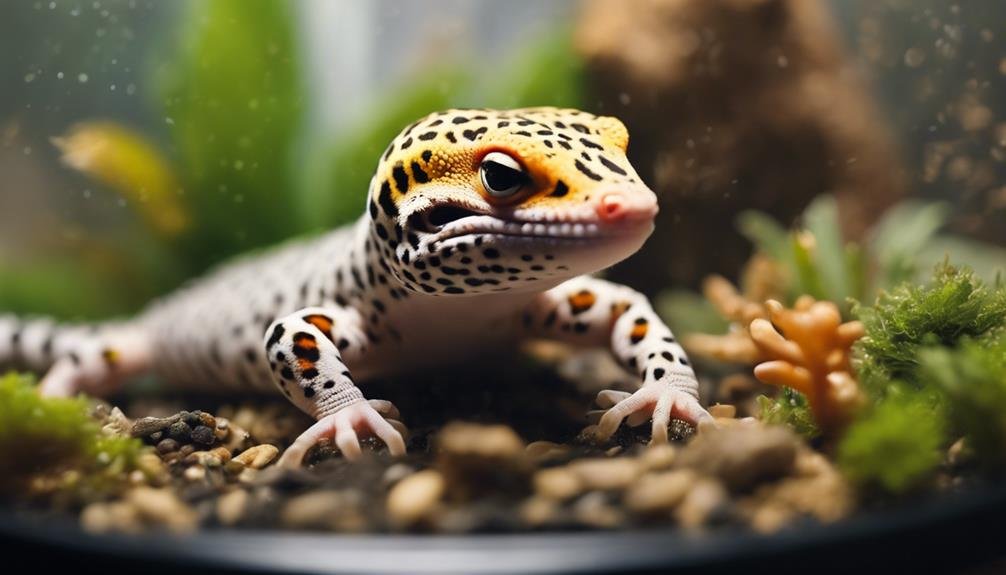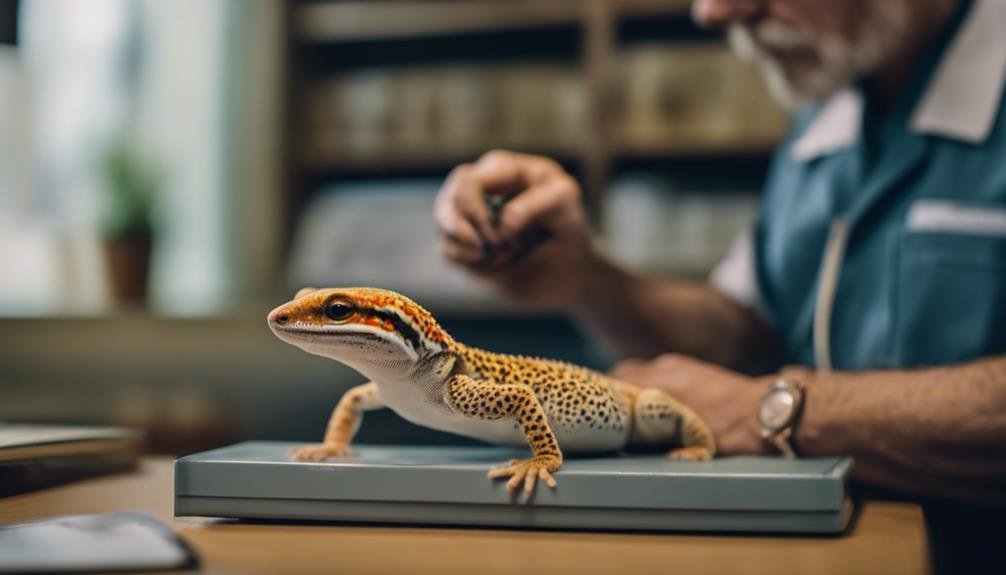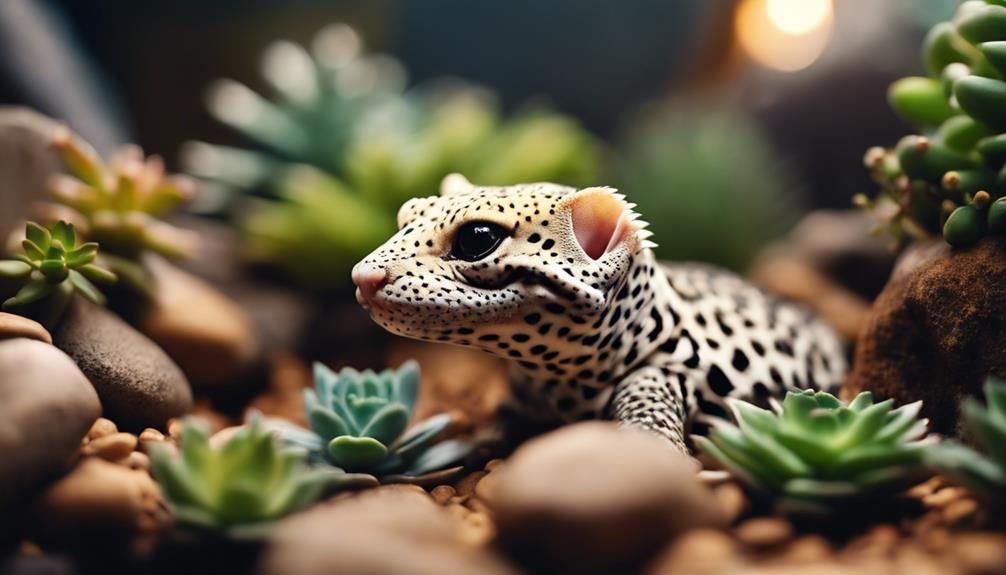You might find yourself wondering just how resilient your leopard gecko can be when it comes to fasting. While these creatures can indeed survive for startling durations without food—ranging from a few days in hatchlings to a whole month in adults—the real question is, should they? Each age group tolerates starvation differently, and understanding these nuances is essential for maintaining your pet’s health. But there’s more to think about than just survival times. What are the risks of prolonged fasting, and how can you monitor your gecko’s health effectively during these periods? Let’s explore what happens to leopard geckos when their feeding schedules are interrupted.
Key Takeaways
- Baby leopard geckos (0-2 months) can survive up to 2 days without food.
- Juvenile geckos (2-6 months) can fast for about 7 days.
- Sub-adult geckos (6-12 months) can endure up to 14 days without eating.
- Adult leopard geckos can last up to a month without food.
- Regular feeding is crucial for maintaining health at all life stages.
Factors Affecting Starvation Tolerance
Several factors influence how long your leopard gecko can go without food, including its health and environment. Generally, healthy adult leopard geckos can go up to 2 weeks without eating. However, this tolerance level can vary based on several conditions.
Firstly, access to clean water is vital. Even when leopard geckos go without food, they must stay hydrated. Dehydration can severely impact their health, reducing how long they can survive without food. Always make sure they’ve access to fresh water.
Secondly, the overall health of your gecko plays a critical role. Leopard geckos in good health can endure longer periods of fasting. If your gecko is already underweight or has underlying health issues, it mightn’t cope well with lack of food. Weight loss during these times can be a red flag indicating that your gecko isn’t just going through a normal fasting phase but might be ill.
If you notice your gecko refusing food and losing weight, it’s important to seek prompt veterinary care. Remember, while leopard geckos can go without food for some time, their survival greatly depends on their health condition and environmental factors.
Survival Duration by Age Group
How long can leopard geckos of different ages survive without food?
If you’re caring for these fascinating reptiles, it’s important to understand that their ability to go without food varies with age. Baby leopard geckos, those cute little ones aged 0-2 months, can only manage about 2 days without food. They’re still developing and need regular meals to support their rapid growth.
Juvenile geckos, who are a bit older at 2-6 months, have a slightly larger buffer, surviving up to 7 days without eating. As they progress toward their sub-adult phase, from 6-12 months, their resilience increases, and they can go up to 14 days without food. This is because their bodies start to store more energy as they grow.
The most robust group, adult leopard geckos, exhibit the highest tolerance. Healthy adult leopard geckos can go up to a month without eating. However, while they can survive this long, it’s not ideal to let them go so many days without food. Regular feeding remains essential for maintaining their health and vitality across all these stages.
Risks of Prolonged Starvation


Prolonged starvation poses serious health risks to leopard geckos, including respiratory infections and significant weight loss. If your leopard gecko goes without eating for too long, you’re risking its overall health and well-being. Extended fasting isn’t something to take lightly, as the consequences could be severe.
When a leopard gecko starts refusing food, it might signal deeper health issues. It’s critical to take note, as prolonged fasting can quickly lead to a downward spiral in their health. Unlike during their brumation period, when they naturally eat less or not at all, any other prolonged refusal to eat should be a red flag.
Monitoring Health During Fasts
During fasting periods, it’s important to monitor your leopard gecko’s health closely to detect any signs of distress or illness early. If you notice your gecko has stopped eating, it’s essential to check the gecko care sheet for any fasting-related guidance. Consistent observation can help you determine if the fasting is part of a normal cycle or if it’s a sign of potential health issues.
Weight loss is a significant indicator that something might be wrong. While some weight fluctuation is normal, noticeable thinning or a sudden drop in weight requires immediate attention. Keep a log of their weight to track any changes accurately; a kitchen scale can be very useful for this purpose.
Ensure they always have access to clean water, as hydration plays a crucial role in their overall health, especially when they’re not eating regularly. If you observe any unusual behavior or continuous weight loss during these fasting periods, it’s time to seek veterinary care. A professional can assess whether there’s an underlying health issue that needs to be addressed. Remember, prompt medical intervention can make a big difference in preventing more severe health complications.
Nutritional Needs and Feeding Tips


To meet their nutritional needs, make sure you provide your leopard gecko with a balanced diet rich in essential vitamins and minerals. This guarantees they maintain peak health and avoid unnecessary weight loss. As you plan their meals, remember that variety is key. Offer them live insects like crickets or mealworms, which you can dust with a calcium supplement to prevent nutritional deficiencies.
Always make certain there’s access to clean water, as hydration plays a crucial role, especially if your leopard gecko decides to fast. These geckos can survive without food for considerable periods thanks to their ability to store fat reserves. However, it’s crucial to monitor their weight regularly. Significant weight loss can be an early sign of health issues, and you’d need to intervene promptly.
To avoid overfeeding, which can also lead to health problems, feed adult geckos every other day. Juveniles require more frequent feeding, usually once a day, to support their rapid growth. Always observe how your leopard gecko eats to ensure they’re consuming enough but not too much. Proper feeding supports their health, allowing them to utilize their natural adaptations during fasting periods effectively.
Signs of Feeding Issues
If your leopard gecko starts losing weight or shows disinterest in food, these may be signs of feeding issues. You’ll need to closely monitor these symptoms as they’re key indicators of potential health problems. Visible weight loss, especially, is a concern. It’s not just about a slight change; significant thinning can imply serious issues.
Keep an eye on your gecko’s tail condition too. A healthy gecko stores fat in its tail, so a thinning tail is a worrying sign. It’s not just about aesthetics; it’s a clear signal that your pet isn’t getting the nutrients it needs. This can lead to further complications, such as malnutrition, which might manifest as lethargy or even sunken eyes. These signs show your gecko isn’t just picky—it might be struggling with deeper health issues.
Can a Leopard Gecko’s Diet Impact How Long It Can Go Without Food?
When it comes to leopard gecko diet tips, understanding the impact of their diet on their ability to go without food is crucial. A balanced and nutritious diet can help leopard geckos go for longer periods without food, but it’s important to seek expert advice for specific dietary recommendations.
When to Consult a Veterinarian


Observing these signs of distress, you should contact a veterinarian if your leopard gecko has not eaten for more than two weeks. While it’s not uncommon for these creatures to skip a meal or two, prolonged fasting might signal underlying health issues.
If you notice any weight loss or behavioral changes, it’s time to act. A veterinarian can determine if there’s a serious condition affecting your leopard gecko’s appetite. Remember, early intervention can prevent more severe complications from developing. Don’t wait until it’s too late to seek professional help.
Here’s a simple table to help you understand when to be concerned about your leopard gecko’s lack of eating:
| Duration Without Eating | Action to Take |
|---|---|
| 1 week | Observe for any changes |
| 2 weeks | Contact your veterinarian |
| Over 2 weeks | Urgent veterinary care needed |
This guide isn’t just about numbers—it’s about ensuring the health and happiness of your pet. Watching your leopard gecko suffer through appetite loss without intervening can lead to devastating consequences. Your prompt response to these warning signs is vital in maintaining the well-being of your cherished companion.
Conclusion
You’ve learned how long leopard geckos can go without food, but remember, regular feeding is key to their health. Whether a baby or an adult, each age group has its limits. Prolonged starvation risks their well-being.
Always monitor their health, know their nutritional needs, and watch for feeding issues. If you’re unsure or your gecko shows signs of distress, don’t hesitate to consult a veterinarian. Keep your gecko healthy and happy with timely, appropriate feedings.



[…] crested geckos and their ability to survive without food are related, especially when compared to leopard geckos without food. It’s important to consider the unique dietary needs and natural habitat of each species when […]